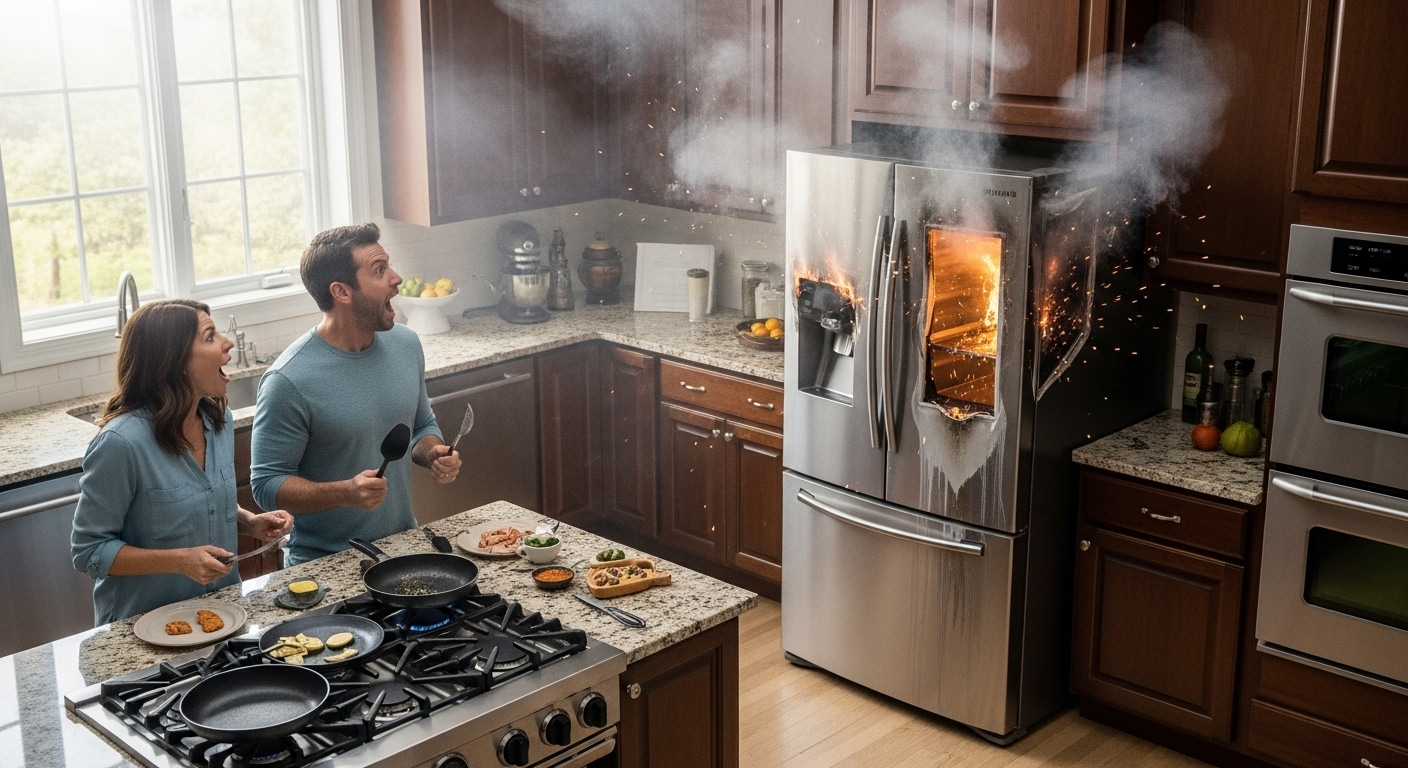A Buyer’s Guide to Making Smart Appliance Choices
Purchasing a refrigerator is a significant investment, often costing anywhere from $800 to $3,000 or more. With so many brands on the market, it’s crucial to understand which manufacturers have consistently disappointed customers with reliability issues, poor customer service, or design flaws. While no brand is perfect, some have earned reputations that should give shoppers pause.
Understanding Reliability Ratings
Before diving into specific brands, it’s important to understand how refrigerator reliability is measured. Consumer organizations, repair technicians, and customer reviews provide valuable insights into which brands require the most service calls, have the shortest lifespans, and cause the most frustration for owners.
Reliability concerns typically fall into several categories: compressor failures that require expensive repairs or complete replacement, ice maker malfunctions that plague certain models, temperature control issues that compromise food safety, premature wear of components like door seals and handles, and excessive noise levels that disrupt household peace.
Brands with Recurring Issues
Samsung
Despite Samsung’s popularity and sleek designs, the brand has developed a troubling reputation for reliability issues, particularly with their refrigerators manufactured in the 2010s and early 2020s. The most notorious problem involves compressor failures, which have led to class-action lawsuits. Many Samsung refrigerator owners report complete compressor failure within three to five years—well before the expected lifespan of a major appliance.
Ice makers are another persistent weak point for Samsung refrigerators. Countless customers complain about ice makers that freeze up, produce hollow ice, leak water, or stop working entirely within the first few years. The French door models with in-door ice makers seem particularly susceptible to these problems.
Temperature inconsistencies plague many Samsung models, with some compartments freezing while others remain too warm. This can lead to spoiled food and wasted money. Additionally, Samsung’s customer service has received poor ratings from frustrated owners who struggle to get timely repairs or warranty coverage.
Frigidaire (Lower-End Models)
While Frigidaire has been a household name for decades, their lower-end and budget models have earned disappointing reviews. Many customers report that cheaper Frigidaire units don’t maintain consistent temperatures, leading to frozen vegetables and warm milk simultaneously.
Build quality is a common complaint, with plastic components breaking easily, shelves cracking under normal use, and door handles coming loose within months. The brand’s budget models often develop seal issues quickly, causing the refrigerator to work harder and drive up energy costs.
Ice makers in lower-end Frigidaire models frequently malfunction, and the water dispensers tend to leak or stop working. For the price point, many consumers feel they could find better quality elsewhere.
Bosch (Refrigerators Specifically)
While Bosch excels at dishwashers, their refrigerators have been less impressive. Customers frequently cite limited storage space and awkward interior layouts that don’t maximize the external dimensions. For the premium price Bosch commands, many buyers feel disappointed by the actual usable space.
Cooling performance has been inconsistent across Bosch refrigerator models, with some units struggling to maintain proper temperatures. Service and parts availability can also be challenging, as Bosch refrigerators are less common than mainstream brands, meaning longer wait times for repairs and higher parts costs.
GE Appliances (Certain Lines)
GE has a long history in appliances, but quality has become inconsistent, particularly since the brand was sold to Haier. Some GE lines perform well, while others have significant problems. The budget-tier models often suffer from poor temperature control and noisy operation.
Many GE French door models experience ice maker problems similar to Samsung’s issues. Water dispensers may leak, and the filtered water systems can be problematic. Additionally, some newer GE models have seen reports of premature compressor failures, though not to the extent of Samsung’s issues.
Quality control seems to vary widely depending on when and where the appliance was manufactured, making it difficult for consumers to know what they’re getting.
Hotpoint
As GE’s budget brand, Hotpoint refrigerators are inexpensive for a reason. These appliances generally have shorter lifespans than mid-range competitors, often showing significant wear within five years. Build quality is noticeably lower, with thinner materials and cheaper components throughout.
Energy efficiency tends to be poor compared to other brands, meaning the savings on the purchase price may be offset by higher electricity bills. Temperature consistency issues are common, and the limited features mean you’re getting basic refrigeration without many conveniences.
Kenmore (Post-2018 Models)
Kenmore was once synonymous with reliable Sears appliances, but since Sears’ decline and the brand’s sale, quality has become unpredictable. Kenmore doesn’t manufacture its own appliances—they’re rebranded models from various manufacturers, making reliability inconsistent.
Customer service is particularly problematic now that Sears stores are rare. Finding authorized service technicians can be difficult, and parts availability varies widely. The warranty support has declined significantly from the brand’s heyday.
Red Flags to Watch For
Regardless of brand, certain features and characteristics should raise concerns. Extended warranties that salespeople push aggressively often indicate a brand or model with known reliability issues. Excessive complaints about specific models on consumer review sites suggest systemic problems rather than isolated incidents.
Be wary of brands that have faced recent class-action lawsuits over specific defects, as these legal actions usually indicate widespread, serious problems. Difficulty finding replacement parts or authorized service technicians in your area can turn a minor repair into a major headache.
Poor customer service ratings, especially regarding warranty claims and repair scheduling, can make owning a problematic refrigerator even more frustrating.
Why Some Brands Struggle
Understanding why certain brands have reliability issues can help you make informed decisions. Cost-cutting measures in manufacturing often lead to inferior components, thinner materials, and less rigorous quality control. When companies prioritize features and aesthetics over fundamental reliability, the result is appliances that look impressive in the showroom but fail prematurely at home.
Rapid introduction of new technologies without adequate testing has plagued some manufacturers, particularly with complex ice-making systems and smart features. Manufacturing location can also impact quality—some brands have seen reliability decline after moving production to facilities with less stringent quality standards.
Brands Generally Considered More Reliable
While this article focuses on brands to avoid, it’s worth noting which manufacturers have better reputations. LG and Whirlpool consistently receive good marks for reliability, though no brand is problem-free. Maytag, KitchenAid (Whirlpool’s premium line), and higher-end Electrolux models generally perform well.
For those seeking luxury appliances, Sub-Zero and Miele have excellent reputations, though they come with premium price tags. These brands focus on longevity and reliability as key selling points.
Making the Right Choice
When shopping for a refrigerator, don’t rely solely on brand reputation—research the specific model you’re considering. Read recent customer reviews from multiple sources, check consumer reports and reliability studies, and ask appliance repair technicians which brands they see most often in their shops.
Consider the total cost of ownership, including energy efficiency and likely repair costs, not just the purchase price. Verify that authorized service technicians operate in your area and that parts are readily available. Check the warranty terms carefully—longer standard warranties often indicate manufacturer confidence in the product.
The Importance of Individual Research
Remember that even brands with generally poor reputations may have specific models that perform well, and reliable brands can have problematic models. Your specific needs matter too—a refrigerator that’s too small or has an awkward layout for your family will be a disappointment regardless of reliability.
Consider how long you plan to keep the refrigerator. If you move frequently or upgrade appliances regularly, reliability may be less critical than if you need an appliance to last 15-20 years.
When Problems Arise
If you’ve already purchased a refrigerator from a problematic brand, document all issues thoroughly with photos and written records. Contact the manufacturer immediately when problems occur—sometimes persistent customers get better results. Consider extended warranties for brands with known reliability issues, though read the fine print carefully to understand what’s covered.
Join online communities or forums for your specific refrigerator model, as other owners often share solutions to common problems. If your refrigerator has a known defect covered by a class-action lawsuit, register to potentially receive compensation or repairs.
The Bottom Line
While this article highlights brands with reliability concerns, remember that appliance quality can change over time as companies improve manufacturing or, conversely, cut corners. The key is to research thoroughly before making your purchase, focusing on recent reviews and data rather than a brand’s historical reputation.
Avoid getting caught up in flashy features or sleek designs at the expense of fundamental reliability. A refrigerator’s primary job is to keep food cold consistently and reliably for many years. Choose a brand and model with a proven track record of doing exactly that, and you’ll save yourself money, frustration, and spoiled food in the long run.
By steering clear of brands with persistent reliability issues and focusing on manufacturers with solid reputations for their specific refrigerator lines, you’ll dramatically increase your chances of making a purchase you’ll be happy with for years to come.



